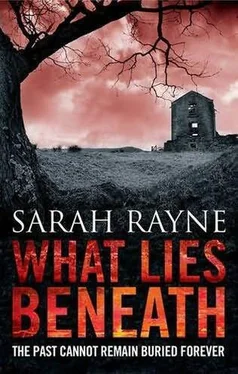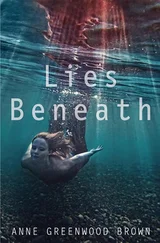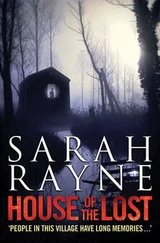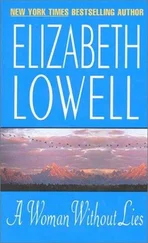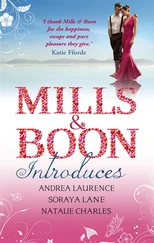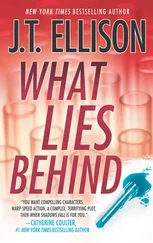Sarah Rayne
WHAT LIES BENEATH
For my brother, Tony Duggan, who provided the concept of ‘The Poisoned Village’ for this book.
Ella Haywood was in the delicatessen counter queue at the supermarket when she heard the news that ripped open her life and brought her childhood nightmares gibbering back.
She had not been expecting those particular ghosts to come boiling out of the past while she was waiting for her farmhouse Cheddar to be cut and weighed, but a gossipy shopper just ahead of her was telling anyone who cared to listen that Priors Bramley was to be reopened – imagine that, after all these years they were going to let people back into the Poisoned Village.
The Poisoned Village. The words fell on Ella’s mind like hammer-blows and for several minutes everything else was blotted out. Priors Bramley, the tiny village abandoned fifty years earlier when a government department had planned to route a motorway through it, and had peremptorily rehoused all the residents elsewhere. The motorway had never been built, though, because another department had seized on the deserted village for an experimental site. Priors Bramley had been drenched in an ill-judged and macabre cocktail of chemicals, which meant the village had had to be sealed off. And no one had been there since.
The gossipy shopper knew all the facts. That long-planned motorway was finally going to be built, she said, very self-important, and in a few days, Priors Bramley would be decontaminated. People would be able to walk down the village street again, right up to the gates of Cadence Manor, if they wanted.
‘Always providing they aren’t worried about breathing in whatever’s still lingering on the air,’ said a sepulchral voice from the end of the queue.
‘Oh, nothing’s lingered there for years,’ said the gossipy one cheerfully. ‘The authorities simply forgot to take down the barbed wire and the notices, that’s all. It’s a piece of the past being reclaimed,’ she added romantically.
‘Reclaimed and then bulldozed and covered with concrete,’ said the pragmatist, to which the shopper tossed her head, said some people had no soul, and went off with her veal and ham pie.
Back at home, panic clutched at Ella’s stomach. She pictured in her mind’s eye Cadence Manor – huge rusting iron gates, the sunshine glinting on them… Ivy-covered walls, crumbling brickwork and an air of brooding desolation… The images rose up sharply, and with them came the memory of her mother declaring the Cadence family had been a bunch of villains, never mind they were supposed to be respected city bankers, rich and influential. ‘Not to be trusted,’ she always said. ‘Not a one of them.’
Still, what had lain behind those festoons of barbed wire all this time surely could not damage Ella – not now. There was nothing she need do about it. Derek would certainly have agreed with that if he knew what was beyond those spiky defences, which he did not. But one of Derek’s philosophies was that you never troubled trouble until trouble troubled you.
Amy, their granddaughter, had once asked Ella how she had put up with Gramps’s little sayings for so long, but Amy’s generation did not understand about marriage – not the permanent kind, such as Ella had entered into. Amy thought that because Gran was young in the 1960s she must have had a permissive, flower-power time, but flower power and the permissive society had never actually reached Bramley, and Derek was then, as now, an auditor at the County Council, and a rising star in the local Operatic Society as well, so flower power and permissiveness had never really been an option.
Amy was coming to stay in a couple of weeks’ time, at the start of the Easter holidays. It would be nice to see her and hear about her life at university; Ella always listened round-eyed to Amy’s tales. None of the things Amy described would have been remotely thinkable in Ella’s own life. But then some of the things in Ella’s life would not be remotely thinkable to Amy – it was important to remember that.
By that evening, Ella felt better. Probably all that talk about opening up the village and finally building the motorway was just a rumour, or an item on a vague council agenda and unlikely actually to happen. There could be protest groups at the destruction of green belt – all kinds of things that would prevent the whole thing.
But the next morning a council leaflet slapped through the letterbox, horridly explicit. Government approval had been given for the revival of the 1950s motorway scheme, said the leaflet, and added firmly that this was very good news for everyone. The motorway would not actually go through Priors Bramley, but a link road would, which meant the demolition of the major part of the village. Preliminary plans could be inspected at the council’s offices between 9 a.m. and 5 p.m. any weekday. Local residents could be assured there was no longer any danger from the chemical trials carried out in the 1950s, but to be on the safe side a team of decontamination experts would go in on the tenth of this month. The information about there being no danger was repeated so many times Ella thought most people reading it would keep their windows and doors closed for the next six months.
She did not take in much of the scientific information about decontamination or the original chemical experiment – she had never been very good at science at school. A boys’ subject, her mother used to say. Concentrate on the cookery classes: that’s what will get you a husband. In those days getting a husband had been the prime goal for girls. Ella sometimes wondered what her mother would have thought of Amy, currently rioting through three years at Durham University, studying archaeology and anthropology.
She threw the council’s leaflet in the bin, but when even Derek began to talk about the Poisoned Village being opened for the new motorway, Ella knew the past was surging forward, and it was a dark and dangerous past. She would have to do something.
Entries From an Undated Journal
The time has come when I will have to do something…
Because in seven days I’m going to die.
There! I’ve written it at last. I am going to die. And now I see it set down on the page, it’s suddenly and dreadfully real.
I’m afraid of dying but I’m equally afraid of going mad while waiting for death – and by mad I don’t mean those spells of darkness that sometimes close down over me like a stifling curtain… They never lasted long, those darknesses – no, I’ll amend that – they never seemed to last long, and in any case it’s important to remember I always managed to fight my way back up into the light.
By going mad, I mean the real thing. The tumble all the way down into an endless, unforgiving blackness – the blackness you see staring out of the empty eyes of the poor creatures locked away in Bedlam: drained, husked-out fragments of humanity who were once people. So let’s make it very clear at the outset that I was never mad in that way.
I’m hoping that writing everything down will stop me speculating what’s ahead. (Will it be quick? Will I struggle?) And although I don’t suppose anyone will ever read this journal, you never know, so I’ll write it as well as possible. I used to have the way of turning a good phrase at one time – it’s vanity to say it, but I don’t care – although I never had any romantic dreams about writing books. But I’ve had my romantic moments, that’s something else I’d like understood.
Читать дальше
